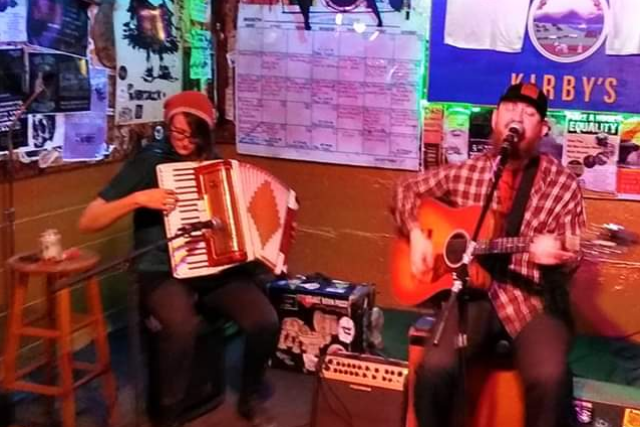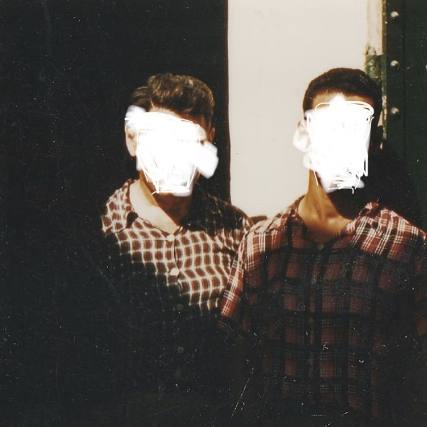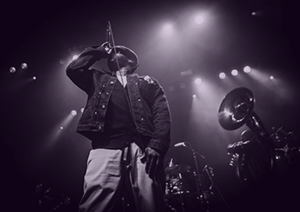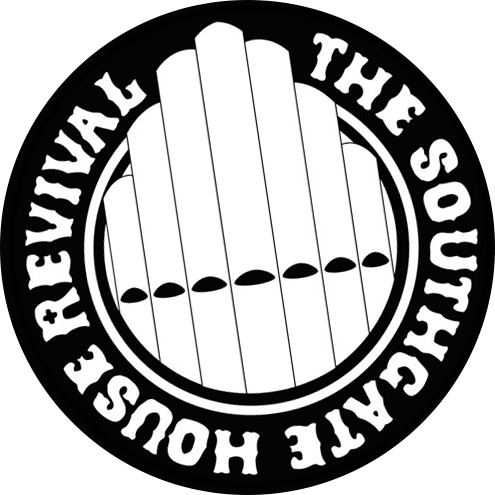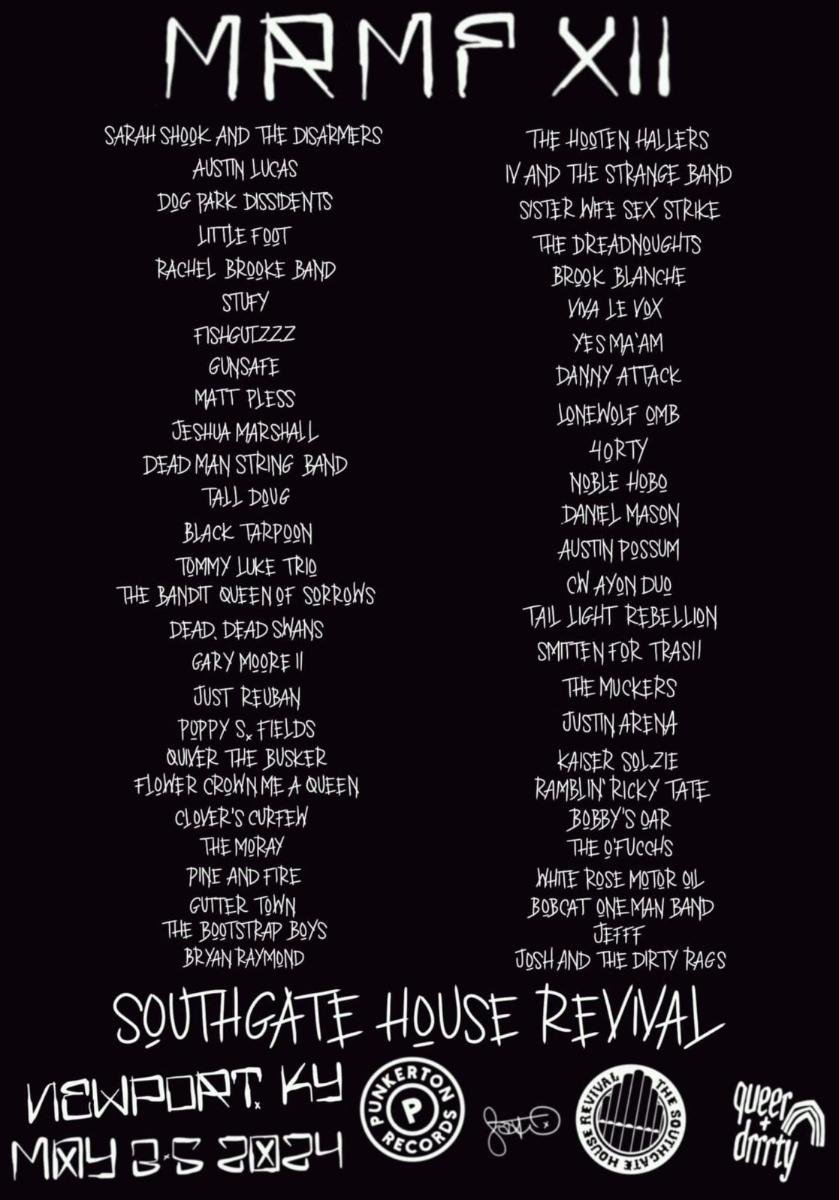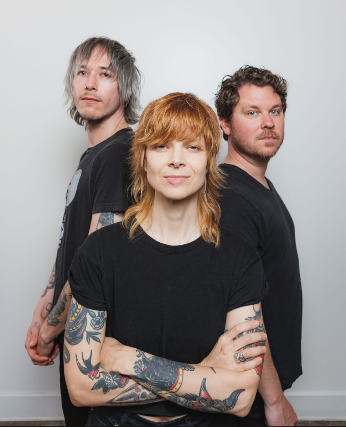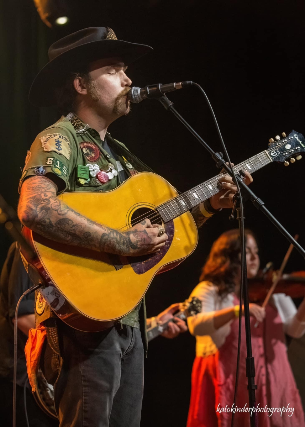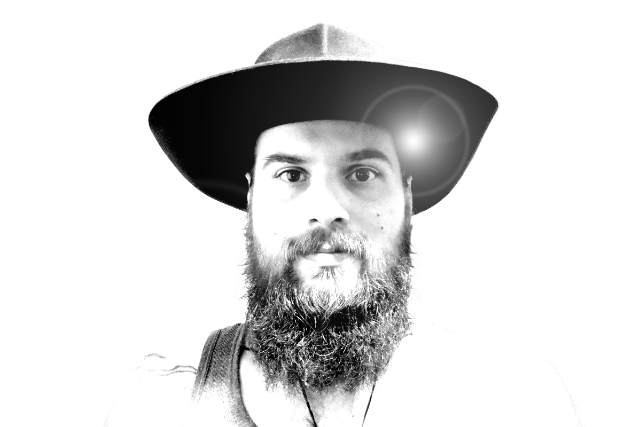$110 for a three day pass.
Schedule:

North Carolina’s Sarah Shook sings with a conviction and hard honesty sorely lacking in much of today’s Americana landscape. Always passionate, at times profane, Sarah stalks/walks the line between vulnerable and menacing, her voice strong and uneasy, country classic but with contemporary, earthy tension. You can hear in her voice what’s she’s seen; world weary, lessons learned—or not—but always defiant. She level-steady means what she says. Writing with a blunt urgency—so refreshing these days it's almost startling—Sarah's lyrics are in turn smart, funny, mean, and above all, uncompromising. The Disarmers hit all the sweet spots from Nashville’s Lower Broad to Bakersfield and take Sarah's unflinching tales out for some late-night kicks. At times, it’s as simple and muscular as Luther Perkins’ boom-chicka-boom, or as downtown as Johnny Thunders. The Disarmers keep in the pocket, tight and tough.
For the past fifteen years, The Hooten Hallers have been crisscrossing the country as inveterate road warriors, bringing their peculiar vision of Americana–a fiery rock and roll fever dream birthed in Missouri’s fertile musical heartland. They’ve put so many miles into the road that they’ve burned through multiple tour vans and left twisted metal and frayed rubber strewn across the road behind them. With their aptly named new album, Back In Business Again, the trio roar back on to the international stage with ten incendiary new original songs drawn from their many travels and inspired by the hardships that all touring musicians have faced throughout a seemingly never-ending pandemic. There’s hope in these new songs, but tinges of madness too, driven by the raw drumming and falsetto howl of Andy Rehm, the infernal growl and swirling guitars of John Randall, and the low rolling baritone and bass saxophones of Kellie Everett. The Hooten Hallers have always been musical colliders, smashing together everything from pre-war jazz to Chicago blues with jaunts around New Orleans and garage rock explorations with hints of punk rock. It’s Morphine meets ZZ Top mixed a dash of George Thorogood and Tom Waits along St. Louis’ Mississippi waterfront. Produced by bassist Dominic Davis (Jack White, Greensky Bluegrass), Back In Business Again takes a match to The Hooten Hallers’ fuse and explodes the renegade power trio to the edge and back again, one vigorous, swinging, perfectly peculiar song at a time. Bubbling beneath the rip-roaring surface of the new album are all-original songs of outsider Americana delight, from tall tales about near-mythological characters, to a eulogy commemorating the demise of 15 years worth of tour vans, to heartfelt blues, thoughtful love songs, and well beyond. Listening to the howls and growls of The Hooten Hallers’ new album, to the burning sax lines and powerful drumming, you’ll hear the pure joy of this band reveling in their newfound groove.

Austin Lucas has come home.
It’s been over two decades since the songwriter packed his bags and left Bloomington, Indiana, the Midwestern town where he spent his childhood years falling in love with rock & roll, embracing his punk roots, and standing his ground whenever intolerant locals didn’t understand his way of life. He returns to that place – both creatively and physically – with his seventh studio album, Immortal Americans. Written after a tumultuous period that found Lucas getting sober, supporting his partner through a battle with cancer, and breaking up with his longtime record label, Immortal Americans is a clear-eyed album for murkier times, rooted in stripped-down heartland rock songs that find the artist reflecting upon the changes in both his hometown and himself.
Co-produced by Lucas and Will Johnson (Centro-matic) and recorded/engineered by Steve Albini and captured in a series of live, full-band performances, Immortal Americans was written after Lucas resettled in Bloomington. He’d been away for years, touring the world as an independent solo artist before signing a record deal with New West in 2013. In many ways, the albums he released during that period were reflections of the music he’d grown up with, from the mountain music of his father (bluegrass musician Bob Lucas) to the punk records that soundtracked his teenage years. Appropriately, Lucas earned a fanbase as a folksinger with punk roots – or was it the other way around? – while touring the country with artists who represented both ends of that spectrum, sharing shows with Willie Nelson one minute and Chuck Ragan the next.
Somewhere along the way, his vices began to get the best of him. He started drinking too much. He gained weight. His marriage crumbled. Albums like 2013’s cowpunk-inspired Stay Reckless and 2016’s Between the Moon and the Midwest shone a light on those challenges, tackling everything from divorce to depression. When Lucas hit rock bottom though, he stopped writing about his temptations and instead, left them behind for good. He headed back to southern Indiana, resettling himself in a town that had changed considerably since he left.
There, in a region suffering from an opioid epidemic, an HIV crisis, and a homelessness problem, Lucas focused on rebuilding his career and his body. He got sober, shedding more than 100 pounds. He recounted the stories of his youth, where, as an outsider in a small town, he dodged beer cans hurled by passing drivers. As he once more walked the Bloomington streets, he learned to embrace his own fighting spirit again. The album’s title track, “Immortal Americans,” emerged from that period of self-discovery.
“My friends and I had to fight for who we were,” he remembers of those early days in the Midwest, “and it was an alienating, anxious, and oftentimes scary way to live. This song is about that fight. It goes out to the most marginalized and at-risk human beings who live in our country, all the people who live on the outside of mainstream society and have to fight every day for their identities and for their existence – because those are the true immortal Americans.”
Meanwhile, Lucas’ new partner was fighting a different sort of battle. Lucas had discovered a lump on her body during their first evening together and the mass turned out to be cancerous. He became not only her romantic partner, but her caretaker too, nursing her back to health after a life-altering surgery and a string of energy-sapping chemotherapy sessions. Lucas continued writing music throughout the process, strumming an acoustic guitar quietly while his girlfriend slept in the next room. Although much of Immortal Americans is influenced by that experience, album standouts like “The Shadow and Marie” tackle the experience directly, shining a light on his partner’s vitality and unending beauty.
“The song opens up with dark lyrics,” he admits, “but the overall point is, ‘We’re still alive. We still have so much to be grateful for. As long as we’re still here, there’s beauty and joy.’ I wrote it to remind my lover that even though she’d been through a crazy ordeal in which her body was permanently changed, she was still beautiful to me. The song may start out on a low note, but as it builds, it goes to a place that’s brighter. It pushes toward something better. In many ways, that’s the theme of the whole record.”
When it came time to record his new songs at Steve Albini’s studio in Chicago, Lucas didn’t reach too far beyond the songs’ unplugged origins. He’d already cut loose from his record label, which meant he was free to chase down his muse without any sort of outside influence. He consolidated his sound accordingly, stripping away the electric guitars and dense sonic landscapes that had permeated his recent albums. In their place, he focused on acoustic instruments and a restrained rhythm section, gluing everything together with lyrically-sharp songs that measured the distance between his rocky past and even-keeled present. The band – whose members included his Dad, who’d traveled north to play banjo with his son – crowded into the same room at Electrical Audio and played together, resulting in an all-analog album that’s both raw and real.
“I wanted it to sound like human beings playing instruments,” says Lucas, “I knew the best thing for this batch of songs was for them to sound as organic as possible. I sang live, playing guitar at the same time, and we worked very quickly. It was an in-the-moment kind of album.”
Immortal Americans is Austin Lucas’ homecoming album, created during a whirlwind period of tumult and regrowth. With its gothic heartland sound and autobiographical lyrics, it’s also Lucas at his most honest, rooted in a string of largely unamplified anthems that don’t rely on electricity to pack a punch.
“I was watching the changes in Bloomington and reflecting upon the changes in my own life,” he sums up. “Not all of this is happy stuff, but there’s hope. There’s light in the darkness. I really do believe in second and third chances, because I know how many chances I’ve received. You have to keep fighting, because that’s what makes life worth living.”
Or, in other words, that’s what makes you immortal.
"Patience is a virtue." Those words are tattooed across Coleman Williams' right arm, forever reminding the alternative-country singer/songwriter of the benefits of taking one's time.
The lesson wasn't always so clear. As the great-grandson of Hank Williams Sr., grandson of Hank Williams Jr., and only son of Hank 3, Coleman spent years waging an internal battle with the expectations thrust upon him by his own lineage. He represented the fourth generation of country music's most legendary family — hence his nickname, "IV" — and the pressure to launch his own career was enormous. Although Coleman would eventually make his mark with Southern Circus — the genre-bending debut from his band, IV and the Strange Band, combining southern storytelling and country textures with 100-watt guitar amps and DIY attitude — he needed to break free first and discover his own musical approach along the way.
"Before I even knew who I was, people were already expecting things of me," he says. "It felt like there was zero freedom of expression for someone with the last name 'Williams.' Singing about a bloodline didn't appeal to me, though. I wasn't interested in fitting into a shadow that already existed. What did appeal to me was the underground scene in Nashville."
Coleman became a fierce champion of Nashville's house-show circuit as a teenager, drawn in by the scene's supportive spirit and DIY ethics. This was a community that valued principles over pedigrees. A community that offered artists of all stripes a place to express themselves. From punk shows to heavy metal gigs to electronic experiments, Coleman loved it all… and for the first time in his life, he felt like he belonged somewhere.
"I was a weird kid who grew up in an unusual situation," he says. "When I began going to house shows in Nashville, I felt like I'd found a family of people whom nobody else wanted — kids who were different and misunderstood — and during these two-hour shows, everyone belonged, everyone felt accepted, and everyone had a place. The experience taught me to trust my instincts. It gave me a new sense of independence. I have to believe that's why Hank Williams made music, too; he could see what it did for people."
Inspired to blaze his own trail, Coleman left town after high school and traveled across America, developing musical tastes that were as diverse as the country itself. Over the decade that followed, he became a history buff, a poet, a metalworker, and an educator. Back home in Nashville, he continued his lifelong practice of writing songs, developing the unique sound — a blend of the amplified and the acoustic, laced with fiddle one minute and heavy guitars the next — that would later fill Southern Circus. Coleman took his time. He wanted the sound to be right. Patience is a virtue, after all.
Local producer Jason Dietz became a fan of Coleman's songs, prompting the two to begin collaborating. Guitarist David Talley joined them, as did banjo player, Daniel Mason and drummer Carson Kehrer. All five musicians (along with fiddler Laura Beth Jewell and steel player, John Judkins who both appear on the record) came from different musical backgrounds, but they worked together to build something new, using Coleman's acoustic tunes as the blueprint for a southern sound that was soothing one minute and strident the next. An album began taking shape. Just shy of his thirtieth birthday, Coleman Williams made his long-awaited debut with "Son of Sin," a single that was released in 2021 by IV and the Strange Band.
"I like to say, 'What doesn't kill you makes you stranger,'" he explains. "I love strangeness and I love my Strange Band. The most genuine people in this world are those who allow themselves to be the weirdos they truly are, because once you repress yourself, that's when you become someone you're not."
Coleman channeled this love of the weird and self-certainty into Southern Circus which bounces between autobiographical songs and story-driven tracks inspired by Coleman's historical interests. On "Inbred," he turns the true-life tale of the Fugates — a Kentucky family whose inbred history attracted the attention and anger of religious zealots during the 1800s — into a song about Christian hypocrisy. "Malice" is a swaggering country song based upon a newspaper article about a married couple who each decided to poison the other on the same morning, while "Drinking Sad" pays tribute to the outlaw country bar songs that soundtracked Coleman's childhood. Appropriately, modern-day outlaw Jaime Wyatt appears on the hauntingly elegant "Broken Pieces," contributing vocals to a song about, as Coleman puts it, "the idea someone can’t truly love you unless they know how fucked up you really are."Perhaps nothing encapsulates Coleman Williams' story better than "Stand Your Ground," a seize-the-day anthem that advises its listener to roll with the world's punches and refuse to remain knocked down. The song opens with a leisurely lope, only to segue into a faster section propelled by train beats, banjo arpeggios, and Coleman's anthemic melodies. There are flashes of country twang and rock & roll grit throughout, fused together by a man who's not afraid to blur the dividing line between those camps. Southern Circus offers a peak into Coleman's personal world, and under this Big Top, all southern sounds — and all people — are welcome.
"PT Barnum always said, 'The clowns are the heart of the circus,'" Coleman notes. "The circus is all about expression — about being yourself and finding a unique family, just like the house-show scene — and clowns embody that spirit. They're comfortable with being themselves, and they're trying to give you a pure, emotional catharsis. I love that. I feel like I'm the clown of this southern circus."
Southern Circus finds a balance between spectacle and spirit, determination and deliverance, melodies and muscle. It's the sound of a man honoring his family tree while planting his own garden. To make it, Coleman had to leave home, explore sounds that stretched beyond his bloodline's catalog, and challenge the world's expectations that he'd join family business. Southern Circus is his homecoming: an album that finds him not falling into a legacy, but earning it.






'If Tim Burton were to throw a surprise birthday party for The Devil at Fats Domino's house,
Viva Le Vox would be the band in the living room'
Viva Le Vox bubbled up out of the South Florida muck in 2008. Often found playing open mics and their local laundromat spreading their peculiar blend of punk rock, ragtime, and blues, their live performances soon gained enough attention to land them in the clubs. It wasn't long before they took their show state-wide. With their first full length release, Desperation Alley in 2009, they ventured out into the southeastern United States. In 2010 they released Wayward Ones and took on the rest of America, touring almost nonstop for the next two years with a short break to record Dirt For Sale with Joe Buck (Joe Buck Yourself, Hank III, Legendary Shack Shakers).
The band's lineup has embodied many forms since its inception, and at this point Tony teamed up with Joe on upright bass to continue spreading VLV's weirdness here in the states and make the jump across the pond to Europe. In 2014 the duo recorded Luv Hungry and made their second run to Europe and the UK in 2015. Upon their return, Tony reunited with original bassist Scarecrow Jenkins and convinced long time friend Johnny Tugboat to take up the drums, soon relocating the base of operations to North Carolina. The trio released The Fall Of Skivvy Starzo in 2016 and continue to blow asses off throughout the galaxy....

There is something to be said about Daniel Mason - the way he captures an audience with his soulful voice - brings back a taste of Blue Eyed Soul with a mix of Country and R&B - writes with integrity and truth. Born in Paris, KY to a small impoverished family, Daniel Mason emerged and matured his God given talent in the local church choir. Raised by a Mother that influenced him with everything from Aretha Franklin, Marvin Gaye and Hall & Oates, to Michael Jackson. From there he developed guitar and writing skills at an early age. As most serious hungry artist, he moved to Nashville TN in '08 to establish himself as a Singer/Songwriter. After 3 years and 500 + shows as the lead singer of a local favorite Nashville trio Amber's Drive, Daniel Mason is pursuing upon his own solo career known as The Daniel Mason Band.




Down to hell and back again is one way to put the feeling behind a lot of the songs currently coming from Dead Man String Band fronted by Northern Kentucky's Rob McAllister. With songs of loss, persistence, and a little tongue in cheek.
Dead Man String Band has headlined the stage at Fountain Square (Cincinnati), played Bunbury Music Festival, headlined the CincyMusic Relaunch Party (2016), and is a staple in the Northern Kentucky and Cincinnati Music Scene.


